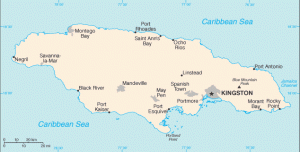The Jamaica Ministry of Health announced the confirmation of four new locally acquired chikungunya cases on the island, bring the total cases, imported and autochthonous, to 21, according to a Jamaica Observer report Friday. The confirmation testing was performed by the Caribbean Public Health Agency (CARPHA).

Image/CIA
The report notes of this number 18 are from local transmission, two imported and one considered cryptic due the uncertainty of whether the virus was contracted while travelling overseas or locally contracted.
This is up from the 17 total cases, 15 local, 2 imported reported by the Pan American Health Organization (PAHO) in their latest update.
Director, Emergency, Disaster Management and Special Services, Dr Marion Bullock DuCasse said that Jamaicans must become even more vigilant against chikungunya with the latest rainfalls in the country, “Mosquitoes can breed in anything that collects water. The recent rainfall has created even more opportunity for containers to collect water and become mosquito breeding sites. At this time persons should also ensure that they cover containers used to store water since we are still experiencing drought conditions. Uncovered drums and water tanks have been found to be the main breeding sites for mosquitoes,” she explained.
Chikungunya is a viral disease transmitted by the bite of infected mosquitoes such as Aedes aegypti and Aedes albopictus. It can cause high fever, join and muscle pain, and headache. Chikungunya does not often result in death, but the joint pain may last for months or years and may become a cause of chronic pain and disability. There is no specific treatment for chikungunya infection, nor any vaccine to prevent it. Pending the development of a new vaccine, the only effective means of prevention is to protect individuals against mosquito bites. For more infectious disease news and information, visit and “like” the Infectious Disease News Facebook page

